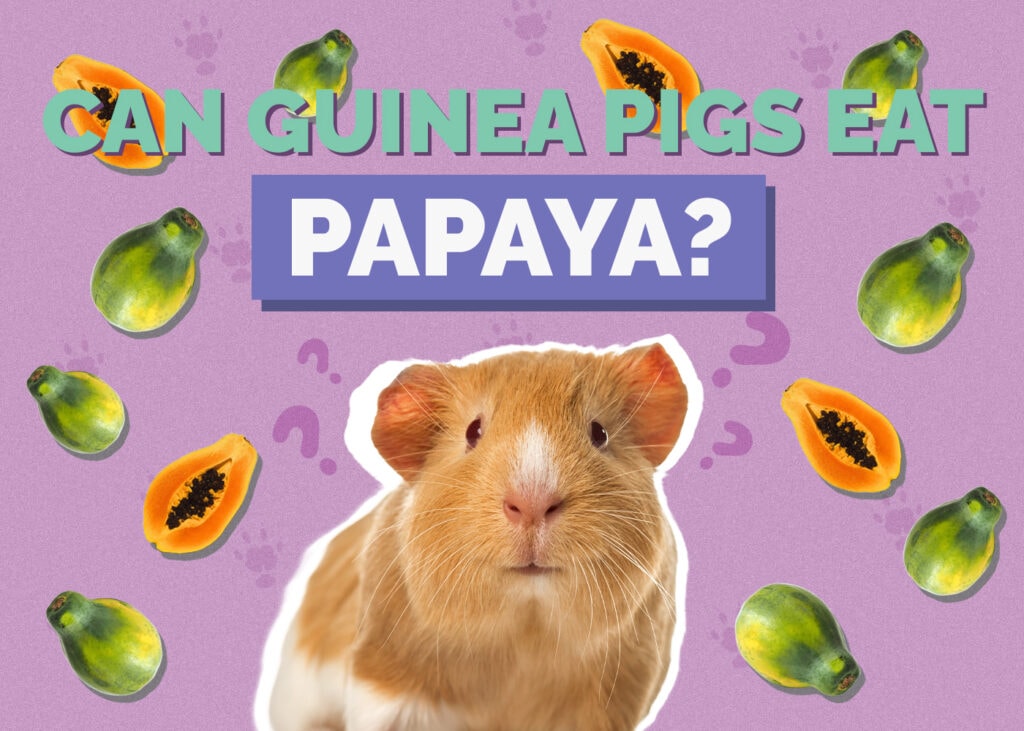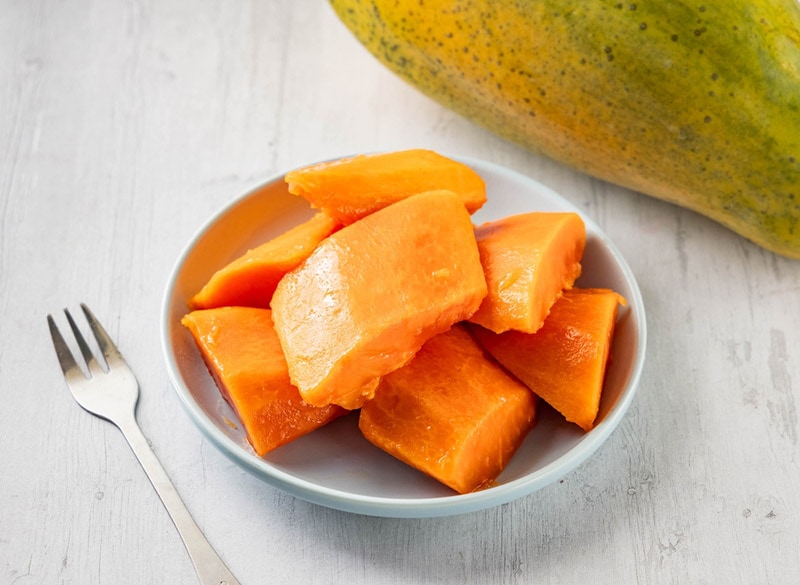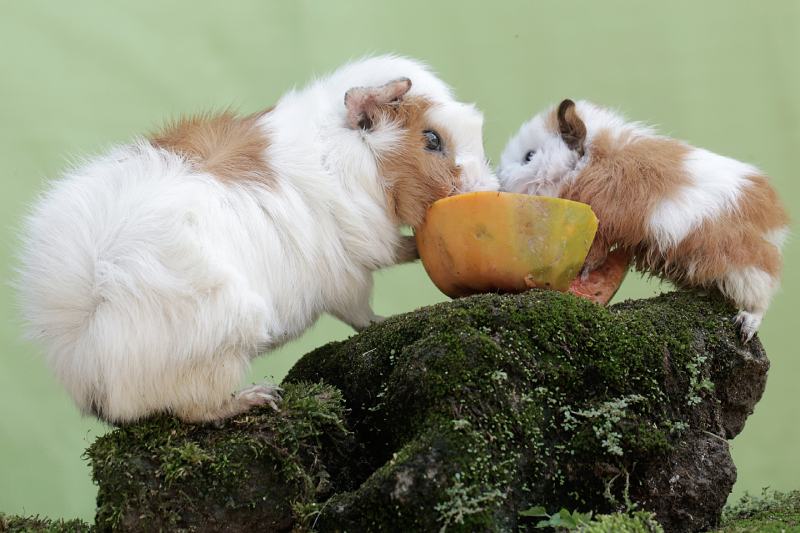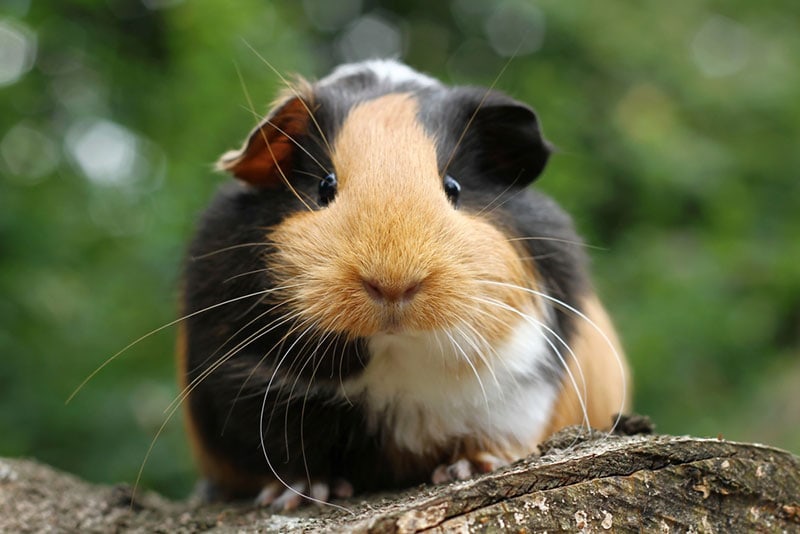Can Guinea Pigs Eat Papaya? Vet-Reviewed Nutrition Facts
Updated on

Click to Skip Ahead
Yes, guinea pigs can eat papaya. Papaya is an antioxidant-rich fruit packed with essential vitamins, calcium, and phosphorus. The nutrients in papaya provide your guinea pig with strong bones, healthy hearts, and overall well-being. It is actually one of the best fruit options you can offer your cavy friend.
Although papaya is an excellent source of nutrition for your piggies, it’s best to serve in moderation due to its high sugar content.
In this article, you’ll learn the nutritional value of papaya and just how much to feed your guinea pigs to avoid risks to their health.
How Much Papaya Is Too Much?
Papayas are an excellent source of vitamin C for your guinea pigs. Guinea pigs cannot produce their own vitamin C (something they have in common with humans!), so feeding them fruits and vegetables that contain vitamin C daily is essential.
However, too much of one thing is bad for anyone, so feeding only a little papaya to your guinea pigs is essential. So, how much papaya is too much?
For optimum health benefits, feeding your guinea pigs three pieces of around 1 inch twice a week is best. Keep an eye on your piggies to make sure one isn’t hogging all the delicious fruit!

Papaya Nutrition Facts
Papayas are a healthy snack for guinea pigs and humans. They are packed with many vitamins and minerals that provide energy to keep you active, healthy, and clear-headed.
Below is a table representing the nutritional value of 100 grams of papaya 1. One hundred grams of papaya converts to about ⅔ of a cup.
| Nutrition | Per 100 grams |
| Calories | 39 g |
| Total fat | 0.14g |
| Sodium | 3mg |
| Total carbs | 9.8g |
| Dietary fiber | 1.8g |
| Sugar | 5.9g |
| Calcium | 24mg |
| Potassium | 257mg |
| Vitamin A | 55mcg |
| Vitamin C | 61.8mg |
| Phosphorous | 10mg |
| Magnesium | 21 mg |
| Protein | 0.6g |
Amazingly, 100g of this fruit would provide more than 100% of a guinea pig’s daily vitamin C requirement. Of course, that is far too much papaya for any guinea pig to consume in a day. Not only is it too much sugar, but it would also cause gastrointestinal upset. But it goes to show that even a few pieces will pack a powerful vitamin C punch
Apart from being an excellent source of vitamin C, papaya has an excellent balance of calcium (Ca) and phosphorus (P). Because phosphorus blocks calcium absorption, if there is more of it than calcium, we can end up with calcium deficiency. The ideal ratio of Ca:P is at least 1.5 : 1, and papaya has a Ca:P of 2:1, making it one of the best fruit options.
Benefits Papayas Provide
- Prevents illness: With high vitamin C content, diseases such as scurvy are less likely.
- Improves immunity and brain function: Because papaya is packed with vitamins A, K, E, and B, it provides higher energy, promoting balanced brain function and a stronger immune system.
- Regulates heart health: Vitamin A provides a healthier heart, kidneys, skin, and eyes.
- Aids digestion: Due to a papaya’s rich fiber content, this fruit maintains a healthy gut for your guinea pigs’ digestive health.
- Promotes healing: Antioxidants contribute to healing inflamed muscles and joints. If your guinea pig has been hurt in a fight, papaya is an excellent resource for healing.
Papaya Risk Factors
Like any new food group, you must introduce the papaya slowly. If it’s your first time feeding your guinea pig papaya, you’ll want to watch them closely for concerning risk factors, such as allergies and sedentary behavior.
- Digestive issues: Although a healthy amount of fiber is provided in papaya, other ingredients such as sugar and chitinases can increase the chances of having diarrhea and gut cramps.
- High sugar content: Too much sugar in a guinea pig’s diet will cause obesity and digestive issues. It’s recommended to only feed your guinea pig papaya three square inches of papaya at a time.
Preparing Papaya for Your Guinea Pig
Ensure the papaya is ripe. If the papaya is hard or green, it’s unripe and should not be fed to your guineas. Thoroughly rinse the papaya to rid the fruit of any pesticides it may have on it. Remove the skin and seeds, and cut into 1-inch cubes. Offer one to your piggies to start with, and observe them for the next 15 minutes for allergy symptoms (very rare).
When giving any new food to your guinea pigs, it is best to start slowly. Give just one piece in the first week, and gradually increase to allow their tummies to adjust.

Frequently Asked Questions
Can Guinea Pigs Drink Papaya Juice?
No, guinea pigs cannot drink papaya juice. Papaya juice contains too much sugar and not enough of the beneficial components.
Can Guinea Pigs Eat Papaya Leaves?
Papaya leaves are safe for your guinea pigs to consume, but they do not provide any real nutritional benefit.
Can Guinea Pigs Eat Papaya Seeds?
Any seed is a choking hazard for your guinea pigs. No, seeds should not be fed to your piggies, so remove all skin and seeds before serving.
Can Guinea Pigs Eat Dried Papaya?
No, dried papaya is unhealthy and unsafe for your guinea pigs. It is like feeding them concentrated sugar. Stick with fresh papaya for your cavies.
Final Words
While it is mostly safe to serve your guinea pigs papaya, you must remember that they contain high levels of sugar, which is dangerous to your guinea pigs’ overall health. Remember, papayas are a healthy snack once or twice a week, and an excellent source of vitamin C and other nutrients that will give your guinea pig stronger immunity and aid in brain and heart health.
Featured Image Credit: 3centista, Pixabay












